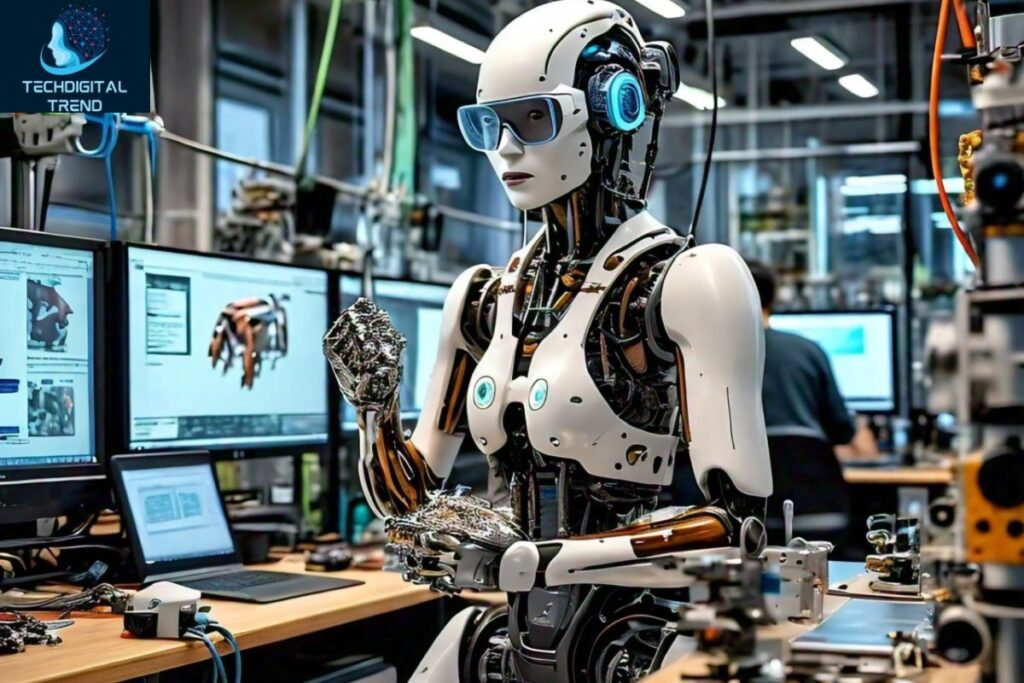Table of Contents
ToggleRobotics Research
Robotics research has made tremendous progress in recent years, transforming the field and revolutionizing applications. From robot learning to control systems, AI is playing a crucial role in advancing robotics. In this article, we’ll explore the latest advancements in robotics research and how they’re impacting the industry.
Introduction to Robotics
Robotics is a field of engineering and computer science that deals with robot design, construction, operation, and use. Robots are machines that can be programmed to perform a variety of tasks, from simple to complex. They’re used in various industries, including manufacturing, healthcare, transportation, and more.
2. Robot Learning
- Robot learning is a subfield of robotics that focuses on enabling robots to learn from experience and improve their performance over time. This is achieved through various machine learning algorithms, including reinforcement learning, deep learning, and imitation learning. Robot learning has numerous applications, such as:
- Reinforcement Learning: Robot learning with reinforcement learning involves training robots to perform tasks by trial and error. The robot receives feedback in the form of rewards or penalties, which helps it learn the optimal policy.
- Deep Learning: Robot learning with deep learning involves training robots to perform tasks using neural networks. The robot learns to recognize patterns and make decisions based on large datasets.
- Imitation Learning: Robot learning with imitation learning involves training robots to perform tasks by observing humans or other robots. The robot learns to mimic the actions and decisions of the demonstrator.
3. Robot Control Systems
Robot control systems are responsible for controlling the movements and actions of robots. These systems use various sensors and actuators to perceive the environment and perform tasks. AI is playing a crucial role in advancing robot control systems, enabling robots to make decisions autonomously and adapt to changing environments.
Robotics Applications
Robotics has numerous applications across various industries, including:
- Manufacturing: Robots are widely used in manufacturing for tasks such as welding, assembly, and inspection.
- Healthcare: Robots are used in healthcare for tasks such as surgery, rehabilitation, and patient care.
- Transportation: Robots are used in transportation for tasks such as navigation, localization, and control.
4. Robotics Applications
Numerous industries, including industry, healthcare, transportation, and education, can benefit from robotics research. Robots are being utilized to help with jobs that are too risky or challenging for people, increase production, and improve safety.
5. Advancements in Robot Vision
Robot vision is a crucial aspect of robotics research, enabling robots to perceive and understand their environment. Recent breakthroughs in computer vision have led to the development of more advanced robot vision systems, capable of recognizing objects, detecting obstacles, and navigating complex spaces.
6. Development of Soft Robotics
Soft robotics is a new paradigm in robotics research, focusing on the design and development of robots with flexible, elastic, or deformable bodies. These robots have the potential to revolutionize industries like healthcare, manufacturing, and logistics.

7. Advancements in Human-Robot Interaction
Human-robot interaction is a critical area of robotics research, aimed at developing robots that can interact with humans more naturally and intuitively. Recent advances in HRI have led to robots that can recognize and respond to human emotions, gestures, and voice commands.
8. Robotics in Healthcare
Robotics research has the potential to transform the healthcare industry, enabling robots to assist in surgeries, provide care and support to patients, and aid in rehabilitation. Recent breakthroughs in robotics have led to the development of robots that can perform complex surgeries with greater precision and accuracy.
9. Robotics in Manufacturing
Robotics research has revolutionized the manufacturing industry, enabling robots to perform tasks that were previously thought to be the exclusive domain of humans. Recent advances in robotics have led to the development of robots that can assemble, weld, and paint with greater speed and accuracy.
10. Future of Robotics Research
The future of robotics research holds much promise, with potential applications in space exploration, environmental monitoring, and disaster response. As robots become more advanced and sophisticated, they will play an increasingly important role in transforming industries and improving lives.
Recent Advances in Robotics Research
Recent advances in robotics research have led to significant improvements in robot learning and control systems. Some of the recent advances include:
- AI-Powered Robot Learning: AI-powered robot learning has enabled robots to learn from experience and improve their performance over time.
- Autonomous Robot Control: Autonomous robot control has enabled robots to make decisions autonomously and adapt to changing environments.
- Human-Robot Collaboration: Human-robot collaboration has enabled robots to work alongside humans and learn from them.
Conclusion
Recent studies have resulted in notable advancements in robot control and learning systems, and the subject of robotics is developing quickly. This progress is made possible by AI, which gives robots the ability to learn from mistakes and act on their own. We may anticipate seeing increasingly sophisticated robots that can do challenging jobs with ease as robotics continues to improve.
- Recent developments in robotics research have broad ramifications for many sectors, including transportation, healthcare, manufacturing, and more. Robots will be able to carry out duties that were previously believed to be the sole purview of humans as they get more powerful and sophisticated.
- Like with any technology, there are worries about how robots will affect civilization, though. Robots might eventually replace human labor, which would cause unemployment and economic instability as they become more sophisticated. Concerns exist over possible robot misuse, including in autonomous weaponry and surveillance systems.
- Notwithstanding these reservations, there are significantly more advantages to robotics research and development than disadvantages. We can develop robots that will improve our lives, boost productivity, and improve our general well-being by advancing the area of robotics.
- The current developments in robotics research, such as robot learning and control systems, have been discussed in this article. We’ve also spoken about how these developments affect different sectors and society at large. As we carry on expanding the realm of robots’ potential, we must also consider the ethical and societal implications of this technology.
Open this link: Tap to here














